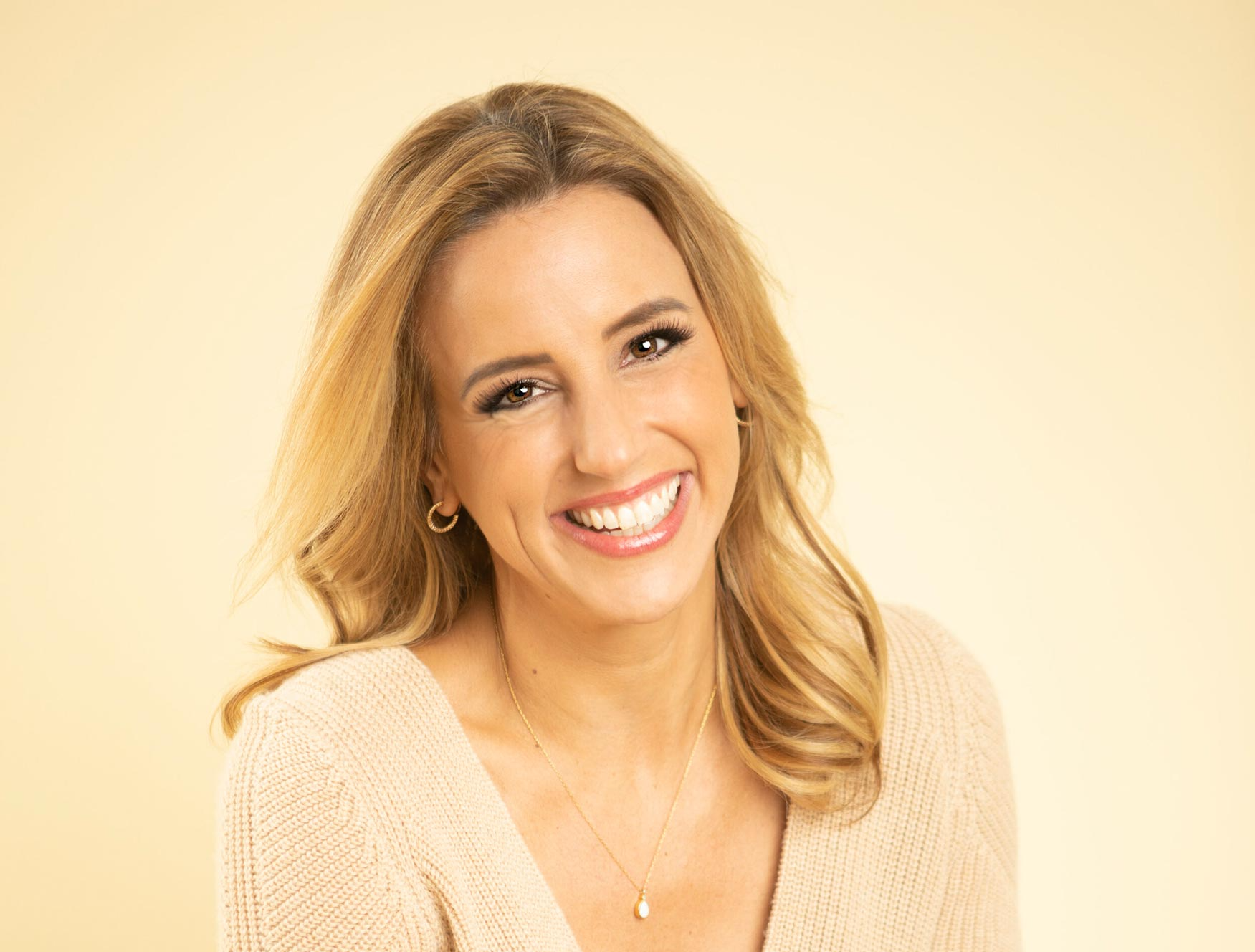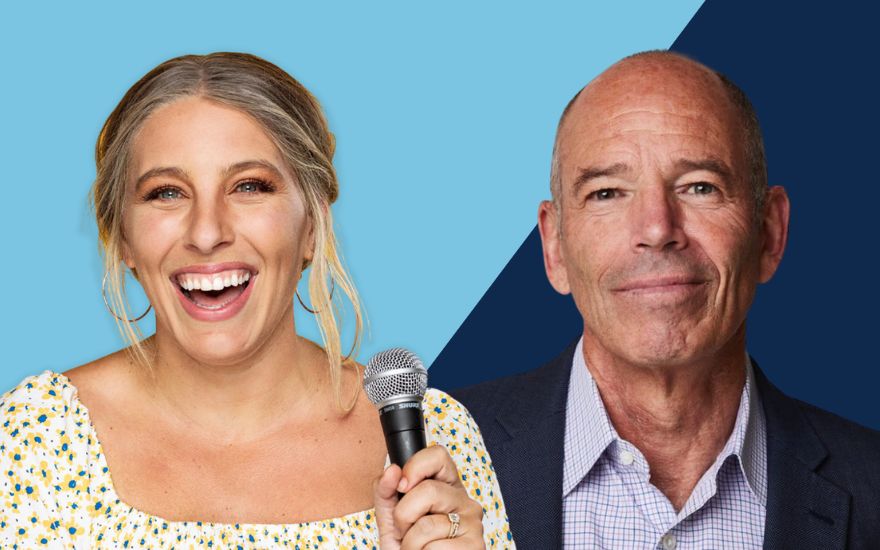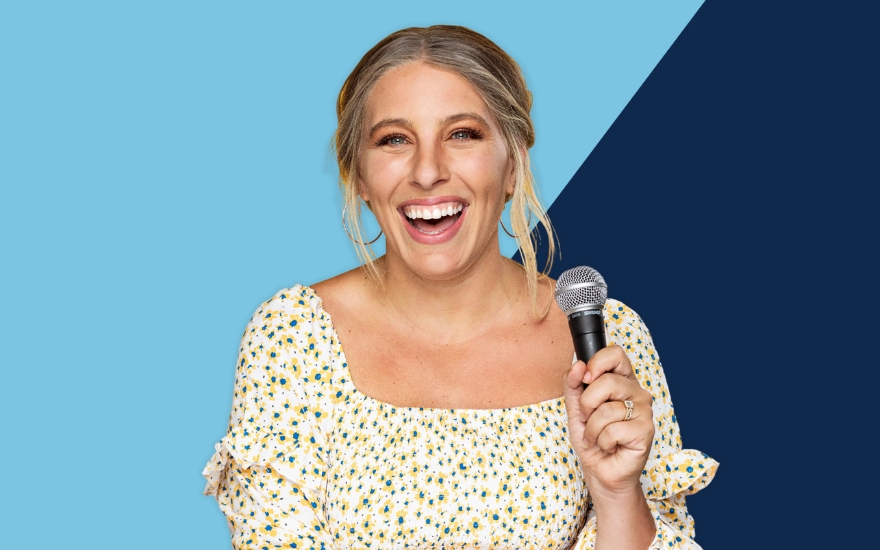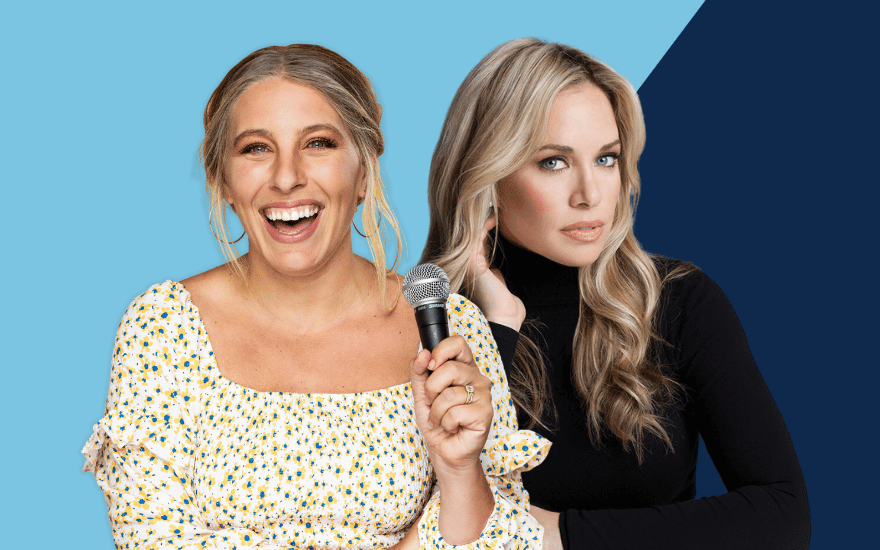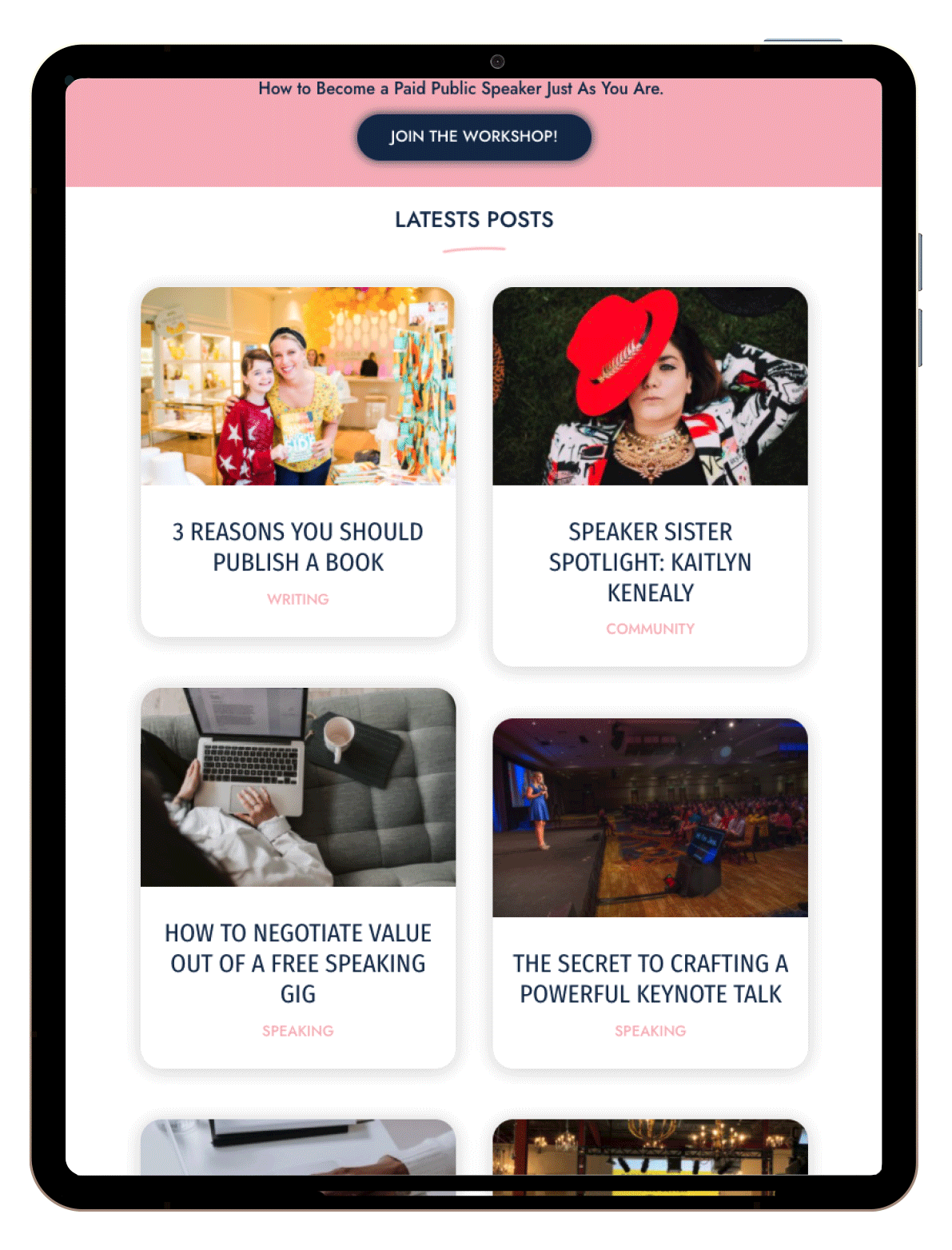


Is Anyone Really a Natural at Speaking On Stage? Perfecting Your Craft, with Rachel DeAlto



JUMP TO
PODCAST HOME
LISTEN TO THE EPISODE
ON THIS EPISODE OF AMPLIFY
What does it mean to be a natural at speaking? Or is that the wrong question, because being a natural at speaking is a load of crap?
Speaking can be taught, speaking can be learned, and we have to learn it somewhere. So when you see someone that is up on stage, so effortlessly sharing their story, or it seems like they have all the confidence in the world, you know what? They have had insecurities before. That happens with anything. If we work at it, we mess up.
Our guest today is Rachel DeAlto, who seems like someone who can be so effortless on stage. But that’s not the reality.
Rachel DeAlto is a relatability and communication expert, motivational keynote speaker, and author of relatable: How to Connect with Anyone, Anywhere (Even if it Scares You).
FOLLOW RACHEL
ABOUT OUR GUEST – Rachel DeAlto
Rachel DeAlto is a relatability and communication expert, motivational keynote speaker, and author of relatable: How to Connect with Anyone, Anywhere (Even if it Scares You).
SHOW NOTES
What does it mean to be a natural at speaking? Or is that the wrong question, because being a natural at speaking is a load of crap?
Speaking can be taught, speaking can be learned, and we have to learn it somewhere. So when you see someone that is up on stage, so effortlessly sharing their story, or it seems like they have all the confidence in the world, you know what? They have had insecurities before. That happens with anything. If we work at it, we mess up.
Our guest today is Rachel DeAlto, who seems like someone who can be so effortless on stage. But that’s not the reality.
Rachel DeAlto is a relatability and communication expert, motivational keynote speaker, and author of relatable: How to Connect with Anyone, Anywhere (Even if it Scares You).
[01:30] “Rachel clearly isn’t capable of doing this.”
[05:11] Reflecting on past mistakes
[08:22] “The house is built. It’s time to live in it. It’s time to enjoy it.”
[10:57] Relatability in relationships and personal growth.
[13:10] Speaking relies on relatable stories, not AI.
[18:02] Building one-to-one connections.
[00:20:15] “My signature story is about a cat allergy.”
Amplify with Jess is produced by Earfluence, and brought to you by Mic Drop Workshop.
TRANSCRIPT
Rachel DeAlto – 00:00:02:
there was kind of this lane that I could be in and somewhat own because no one’s really talking about the pizzazz that comes with being a little bit more, you know, a little bit more on the authentic side, a little bit more on the present side on all of these elements, relatability that I talk about that just change our relationships and really create this potential for growth, whether it be financial growth in the business world or personal growth because of your personal relationships.
Jess Ekstrom – 00:00:33:
Welcome to Amplify with Jess Ekstrom, a show designed to help women get out of their head and into their zone of influence. Okay, so what does it mean to be a natural at speaking? Well, personally, I think it’s a load of crap. Speaking can be taught. Speaking can be learned. And we have to learn it somewhere. So when you see someone that is up on stage so effortlessly sharing their story, or it seems like they have all the confidence in the world. Trust me, they have had insecurities before. That happens with anything. We work at it. We mess up. I could create a whole book about all of the mistakes I made. In fact, that’s mostly what Chasing the Bright Side is about. Well, our guest today is also a dear friend of mine, Rachel DeAlto. And she might seem like she is someone who can be so effortless on stage. You’ve seen her on TV, but she has had to work at it. She started off as a lawyer, which is like the shock of the century to me, now turned TV host and speaker. You’ve probably seen her on shows like Married at First Sight. Her first time on TV, though, didn’t actually go as planned. So let’s bring on our guest, Rachel DeAlto.
Rachel – 00:01:42:
Very first TV appearance was on Fox Business. And I was so excited about it because I was like, I got this. And then I wasn’t prepared because being on TV is very, it’s different than anything in the world because you have to speak in soundbites. And I just, after that one, one of our investors’ sister was saying, we need to hire a media person because Rachel clearly isn’t capable of doing this because I rambled a little bit. Yeah. I just, I didn’t get to the point quick enough. It’s a three minute segment, so you’re not really hitting the points effectively. And so I took that to heart and I said, no, no, no, I got this, but I’m going to go get trained. And so I went and I did some media training. One of my good friends was in PR. And so we really worked on those soundbites and just figuring out how to do it differently. And then you go into speaking and you’re like, no, no, no, no. Now you have to talk nonstop for 60 minutes.
Jess – 00:02:40:
Right. Now let’s expand it. But that is crazy to me, Rachel, because you are like one of the most polished people I know. And so like, I mean, polished people on, on camera, I, you know, after a few margaritas, like a different story. No, I’m just joking. But you, the fact that it was like not fire right out of the gate is something I love because it’s like, oh, if this can be trained, then this can be anyone. So what were some of the things like in that, in that media? Training in the beginning that you were like, oh, okay. This is what I got to do to have a presence.
Rachel – 00:03:17:
Yeah, it’s interesting because it’s just, it’s figuring out the medium that you’re working with and then delivering the content in a way that best resonates with the audience. And so for me, I had to look at things differently. This wasn’t, at that point I was, I was still a lawyer. And so obviously lawyers can babble on forever. Nobody’s cutting them off. We get to the point eventually circle round. But really what I was trained in was figuring out how to create those soundbites. What are the, what’s the 10 second clip that still makes sense if it lands on its own? And you know, really practicing that. And then I did the radio. Like, I don’t even know if people do radio anymore, but I did, there weren’t even really podcasts. Yeah. Yeah. Right. Yeah. So I was doing radio and radio segments back then, you know, on real radio stations that were only like five minutes long. So I was doing all day and night radio interviews and you just got better. And it was very similar to speaking when you first get in that you’re not good. Good. Just like you’re, you’re not. And that’s okay with that.
Jess – 00:04:24:
Exactly. Like, I mean, even like this show, very different than speaking. Uh, like, I mean, there’s parallels, but like, I have to realize, like, I mean, the beginning of this episode, this is our new like studio. I don’t know where to look. I’m like fumbling the bag, but I’m like this, you have to be comfortable being a beginner in order to eventually be good at anything as adults. Like, I can’t, it’s hard to compute that, but like my daughter who’s seven months and I know you’re a mom as well. It’s like, well, of course she, she started crawling this past week. So now it’s totally from ball game, but it’s like, of course she’s going to face plants and she’s okay with that because she’s like, yeah, this is what I do. This is how you learn a skill. I got to like fall on my face a few times as adults. It is like, we immediately jumped to, well, if I am bad at this, then that’s just definitive, like an end statement. So what are the things that you tell yourself, like in the beginning of anything, like writing your book, being a speaker, that’s like, okay, I got to be comfortable with being bad at this. How do you, how do you get through that? Especially with you being so public too.
Rachel – 00:05:31:
It’s a learning curve. I do think so. And it’s, I think, the hardest thing for me, and I still grapple with this. So maybe we could resolve this on air. But I have challenges.
Jess – 00:05:41:
Hey, step into my office.
Rachel – 00:05:43:
Let me go lay down in the back. But it’s funny, I look at my books. And so I wrote a book a long time ago when I was doing all that initial TV. So we were still promoting the company and the branding expert that we worked with said, you need to write a book. And so we wanted to get you on air immediately. So I wrote this really terrible book. And it was, I wrote it in like 10 days. And we did a hybrid publisher and just got it out there to get me on more TV. And it worked. After that, I was doing the Today Show, I was doing Steve Harvey. And I’m still embarrassed that it exists in the universe. And so it’s similar, like, looking at, like the first I did, my first speaking gig was a TEDx. And so I look back at that, I was like, Oh, my gosh, can I? Can I wipe that off the internet? Like, can we make that go away? And so that’s the hardest thing for me is still looking back at things because it’s been so public along the way where I just I’m wondering if there’s a hacker that could help me out or something. Because that’s still something I deal with.
Jess – 00:06:44:
But here’s the thing. I have a very similar story in that my first book was self-published. I was speaking at a lot of colleges. I was like, I got to get a book. Self-published a terrible book. One of my first speaking engagements was a TEDx talk. So it’s like, oh, let’s go down the black diamond before the bunny hill. But I will say no matter what like the quality was of both of those things, the book and the TED talk, it still yielded me an opportunity. And so that’s like I think that’s sometimes hard for people to wrap their head around. Sometimes it doesn’t matter how good it is. It’s the fact that you’ve done it. Would you agree?
Rachel – 00:07:25:
I completely agree. It’s a hard one for me. It’s a hard pill to swallow because I’m not a perfectionist, but I also, I think the challenge is too, it’s like when you’ve now done the reps and these things happened 10 years ago and you look back and you’re like, but I’m so much better now. But you have to reflect on it and realize that that led you to where you are now. It was the inspiration for a lot of the evolution and it’s okay if it’s out there.
Jess – 00:07:52:
Do you think that it goes through seasons? I feel like I have seasons where I am like, okay, I know how to ski. I’m not going to take up snowboarding. Like, I just want to ski. And then you have seasons you’re like, let’s shake things up. Let’s snowboard. But it’s like recognizing that you also don’t have to always be going after the next skill. And it’s okay to coast and use the things that you know. Like, you got married this year. You have a lot going on. Are you like, what season, I guess, of life are you in right now?
Rachel – 00:08:29:
I am in enjoyment. And I feel like if we’re looking at the building of a house, the foundation’s done, I’m just tinkering. That’s where I’m at right now. The house is built. It’s time to live in it. It’s time to enjoy it. And it’s time to pick out artwork. That is the analogy that I would give for my life right now. But I remember being in that season of, oh my gosh, I need another degree. I don’t, however. You know, where it’s like I constantly, before that it was the certifications and then the certifications weren’t enough. So I went back to real school and it’s not that certifications aren’t real school, but it was just this constant pursuit of credibility and validation. And now I don’t know if it’s age or kind of just hitting a stride where I’m thinking, I’m good. I just want to enjoy it. I love my job. I love my life. And yeah, I’m in the tinkering stage. I don’t know that I’ll live there forever. Eventually. I’ll probably redo the room, but right now I’m good.
Jess – 00:09:29:
You know, I was listening to some podcast episode. I think it was Armchair Expert and they were interviewing Nora Jones. And she was like, I would have seasons of like totally dry creativity where I wouldn’t write a single song. And I would say, okay, it’s all used up. Like. It’s gone. My greatest days are behind me. All of my, you know, platinum hits are behind me. And then one day it just comes back. And so she’s like inspiration. And like that ambition, I think is fluid. And I think when we trick ourselves to, to feeling like we have to live at that volume setting all the time, it gets us in trouble because then you start to panic. You’re like, well, I should be writing another book. I should be speaking more. I should have a new keynote. I should be doing all these things. And it’s like, no, that things come in seasons. I mean, this year, like having Ellie, I’ve, I’ve, you know, voice members memoed you crying many times, like, does it get easier? I can’t sleep. I’m not doing anything. And so it’s,
Rachel – 00:10:30:
And I think I said yes and no.
Jess – 00:10:31:
Yeah. It gets easier and harder at the same time, I think was your answer, which is true. I appreciate, but yeah, like it comes and goes, which is why I loved the pivot that you made in your career. Like you’ve started off really, as like the relationship expert. And now it’s like, no, that, that pivotal point of relationships and human connection is relatability and relatability is something that’s like, what we’re talking about now. It’s like understanding that we don’t have to live at our highest volume in order to connect with each other. Like finding those connection points can be in lower settings. So what was it about relatability that caused you to like, Oh, I’m going to, I’m going to drive in this.
Rachel – 00:11:16:
Yeah, it’s interesting. It actually, it came from my work in TV on the relationship side, the romantic relationship side. And that was my foundation. And I’ve always said that the foundation of all relationships is the same. It’s just, you know, sometimes there’s some side benefits in certain versions of relationships. But I was on Married at First Sight for a couple seasons. And when I left, I kept getting messages from people. And I talked about this in my keynote where they kept saying, you know, why did you leave? You were such a relatable expert. And it really kind of gave me pause. And I thought, well, what does that mean as a talking head behind a camera? What are they feeling from me? How does this happen? And then I started really studying people who truly are relatable, people who truly connect. And it just, I found that there was just something bigger than what was already out there in terms of connection building and communication, workshops and books and whatnot, and realized that there was kind of, this lane that I could be in and somewhat own because no one’s really talking about really that kind of that little, the pizzazz that comes with being a little bit more, you know, a little bit more on the authentic side, a little bit more on the present side on all of these elements of relatability that I talk about that just change our relationships and really create this potential for growth, whether it be financial growth in the business world or personal growth because of your personal relationships.
Jess – 00:12:41:
It made me think of, you know, when you’re a kid, did you ever like run into your teacher outside of school, like at the grocery store or something? And you’re like. You’re a real human. Yeah. Also, shout out to all teachers. I feel like if they go to the grocery store to like get a box of wine, they probably have to hide it under some like lettuce or something for students not to see them.
Jess – 00:13:05
I buy them the wine.
Jess – 00:13:06
Yes, I should do that next time. But it was like a moment, you know, as a student, you’re like, oh my gosh, this is a real person. And it changes your relationship. And I feel like that is a tactic in speaking that. Used to not be there. It was like speaking was very credible, like high stakes, high energy, step into a role, like lights, cameras, action. Whereas now I’m seeing in the speaking industry, which is like what I teach at Mic Drop Workshop is like, no one wants to watch a speaker that they don’t feel like, oh, that could be me one day. And if you’re standing up there saying, well, like one day I had this idea and the next day I’m a gazillionaire and I’m going to space next week. No one is like, oh yeah, that could be me. And so talk about relatability in the speaking landscape.
Rachel – 00:14:01:
Yeah. And in the speaking landscape, it really comes through our stories. And that’s where I find I connect the best with my audience is when I’m telling stories. And it’s interesting because I look back and part of the reason for those earlier speeches, I wish I could wipe it because it was such from a professorial standpoint of, you know, this is how we do things.
Jess – 00:14:21:
I think I said the word whom one time in one of my speeches.
Rachel – 00:14:25:
Here to for.
Jess – 00:14:26:
Yeah. Thou shall not ever. Yeah.
Rachel – 00:14:29:
But it was just it was very informative, I guess, I thought, and boring. But I think we as speakers, we connect through our stories and the stories that whether it’s the stories that humble us and the stories that, you know, paint the picture of our lives. But all the stories do is they create that that authentic moment, that authentic moment in time, unless you’re a speaker that makes up your stories, because I know some of those. Please don’t. We can feel it. Yeah, exactly. But like, create those those opportunities. For people to have a shot into your life, have that camera where they kind of get who you are and and have seen the different versions of you. And that’s where I think in speaking, you can become so relatable and so connected.
Jess – 00:15:12:
What’s interesting to me is and not to take like a hard right in this conversation, but. What I’ve been thinking a lot about speaking and artificial intelligence. Cause it’s like, this is my job to stay on the forefront of this and the speaking world. And I think that artificial intelligence can be a great tool for speakers to like, Hey, give me a headstart on my slide deck or like, Hey, how do I. Sum this idea up in a soundbite or in a one-liner. But when we talk about AI taking our jobs, the thing that it, at this phase right now, can’t do is put our personal stories and our personal fingerprints on how we talk about it. And so when it comes to being a relatable speaker, the thing that artificial intelligence can’t help you with is nailing those stories and saying, this is when it happened to me, this is how I felt about it. And really contextualizing those lessons, sure, it can help you get your slide deck together or get a step ahead in maybe the organization of your keynote, but it can’t. Go through your life experiences and pull out those moments and put it into a relatable story.
Rachel – 00:16:33:
Agreed. Yeah, there’s so many nuances of emotion that AI thankfully doesn’t have right now. I think there’s always going to be an asterisk and I think any conversation about it, because we don’t know where this is going to end up and part of it’s a little frightening. But we’re still, the human connection can’t be replicated. I don’t care how good the computer gets. And at the end of the day, that’s what we do, I think, as speakers, is really create opportunities for that connection to multiply. And whether people are talking about connection on stage like I do, or talking about positivity like you do, or wherever people’s, their lanes are, it all creates connection.
Jess – 00:17:16:
I was listening to an interview with Brian Chesky, the Airbnb co-founder, and he said that technology is designed to make things efficient, but human connection is by design inefficient. So it’s harder and harder for us as technology advances to put human connection first because it’s inefficient to meet someone for coffee when you can shoot them a text. It’s inefficient in this post-pandemic world to sometimes host an event with a thousand people when you’re like, well, we could just go on Zoom and hit the live stream. But the human connection is invaluable, but also inefficient. And so I think that that’s the battle these days is the Reliability is so important. And you have to get that through human-to-human connection, but also at the risk of, sometimes it’s inefficient and companies and corporations are looking for efficiencies.
Rachel – 00:18:15:
Sure. And you know what, I do think that we can still grow relationships virtually, we can have connections. And I think what we started with is talking about Clubhouse. And there’s, obviously, we weren’t even seeing each other. And we were growing legitimate connections with people just through audio. But that happens over Zoom, that happens over the phone, that happens over our voice text exchanges, you know, those, those are all ways where they’re inefficient is that they’re not mass, this is not done at scale, it’s still one to one. So whether you are trying to, you know, build a relationship online or offline, it has to be one to one, one to many is never going to create a super long lasting relationship that’s going to, it can create good feelings. Like if we’re going to talk back to talk back about speaking, obviously, it’s a one to many moment, right? You get on stage, you could be speaking to 15 people or 15,000 people. But it’s one to many, we’re going to make a connection with that audience, and they’re going to feel connected to us. But that’s not quite a long, lasting, loyal relationship yet. It has to be one to one, and we have to be willing to put in the time. And I would argue that even if it isn’t efficient, in the short term, the long term ROI is always worth the effort. And maybe the efficiency needs to be reevaluated. Because, you know, if you continually put in that effort and continually put in the time. It’s going to pay off, whether it’s going to pay off in an emotional ROI, financial. I mean, there’s so many ways to benefit.
Jess – 00:19:41:
Yeah. Yeah. That’s such a good point. I’m speaking in Texas tomorrow and I Oh, and there’s an earlier flight that I could get on that if I like to get off stage, get in my rental car and haul to the airport, I could get there. And then there’s a later flight that would allow me to stay after I talk, meet people, and sign some books. And I had to be like, no, we got to do the later flight because it’s the one to many on stage. But then you have to get that that one to one afterwards. And it’s just a it’s interesting because as a speaker, the audience member might feel like it’s one to one, even though you are one to many. And so being able to fulfill that is necessary and can be tough sometimes as a speaker. One thing that I would love to end with that is a question that I get a lot in mic drop workshop and it relates to relatability is a lot of people feel like in order to be a speaker or an expert in their fields, like they have to have some big story. You know, some like, oh, I climbed all seven summits or like I saved a million kittens from trees or whatever it might be. And. What would you say to those people who are kind of counting themselves out because they don’t think that their credentials are there, even though they have something to say?
Rachel – 00:21:14:
Yeah, I was that person in the beginning where I actually went to the moth trying to find story inspiration because I kept thinking, you know, I don’t have this catastrophic experience or this monumental experience. Like I’ve had a lot of experiences, but none that really fit into what I wanted to talk about. And so, you know, for anybody listening, my signature story is about a cat allergy. It’s something I lead with. And I literally have to show you this because it’s turned. I have merchandise around him now.
Jess – 00:21:47:
Let me see. Oh, my gosh. OK, for anyone listening that’s not watching, she has this cat mug and pens that are now her brand.
Rachel – 00:21:57:
Yeah. So I tell this story about Blueberry the cat and how I was willing to forsake biology to forge a connection. And so it’s this funny story. But that’s my story. You know, this isn’t some sort of this is. It’s not an Everest moment, although I’m still jealous of anyone who’s able to do that. I’m pretty sure I die in like the first three feet. But, yeah, you don’t need that. There’s so many life experiences, whether they’re monumental or they’re funny or they’re, you know, quirky, whatever they are. They’re your stories and they can they can fit in ways that you never thought of. So really working with someone to figure out, OK, what does this look like and how can I expand this out?
Jess – 00:22:36:
And having those relatable stories, I would say, especially at the beginning of your talk, I always train students like that first story, like make it a childhood story, make it something that people can like. Draw the connection point from where they’re sitting to where you’re standing and being like, oh, she’s allergic to cats or, oh, she did lemonade stands or whatever it might be, because then anything else you say, they now have a foundation. And that is the principle of you and your book, Relatable. Everyone go buy it. It is a great read, whether you want to speak or not. I think a lot of leaders should read the book Relatable because you can connect more to your people, your teams, if you can find those relatable points. But where else can people find you? What’s your channel these days? Is it TikTok? Because that’s where I like to watch.
Rachel – 00:23:25:
No. Yeah. That’s what I consume the most because I just sit there laughing and then I show my husband. He gets to be annoyed with me every four minutes. I’m like, how are you?
Jess – 00:23:33:
My husband stopped reading my TikTok DMs. He’s like, we’re done. You have like a daily limit of 10. Yeah.
Rachel – 00:23:37:
I was like, did you see the polar bear? So yeah, I mostly consume TikTok, but in terms of posting, it’s been LinkedIn lately, which is a very interesting shift for me because it’s really just focusing on kind of where I’m going. But yeah, consumption of TikTok. But if you want to connect with me, I’m pretty much on LinkedIn.
Jess – 00:23:57:
Then you are on the right show. Rachel, thank you so much for being here. Thank you for your friendship over the years. And I’m excited to see you in person in a couple months in Arizona.
Rachel – 00:24:06:
I know, I can’t wait for December.
Jess – 00:24:08:
Yeah, I can’t wait. Awesome. You rock. Thanks everyone for tuning in. We’ll see you next week. Thanks for listening to Amplify. If you are a fan of the show, show us some podcast love by giving us a rating and review. And give us a follow at Mic Drop Workshop and at Jess Ekstrom. This episode was edited and produced by EarFluence and I’m Jess Ekstrom, your host. Remember that you deserve the biggest stage. So let’s find out how to get you there. I’ll see you again soon.
MORE FROM THE AMPLIFY PODCAST
Netflix Co-founder Marc Randolph on Testing New Material On Stage
JUMP TOPODCAST HOMELISTEN TO THE EPISODEON THIS EPISODE OF AMPLIFYAs co-founder and first CEO of Netflix, Marc Randolph led the company from its inception in 1998 through its IPO in 2002. He left the company a year later to pursue other passions, which includes public...
More Doors Open When You Take the Opportunity
JUMP TOPODCAST HOMELISTEN TO THE EPISODEON THIS EPISODE OF AMPLIFYWhen Jess was in college, she applied for an internship with NBC’s Today Show…and got it. In the back of her mind though, she was pretty sure she only got the job for a nefarious reason. But did that...
Creating Confidence On Stage, with Heather Monahan
JUMP TOPODCAST HOMELISTEN TO THE EPISODEON THIS EPISODE OF AMPLIFYToday we explore what many of us struggle with - the power of confidence and self-belief. The trick is that confidence is a muscle we can work on every day, and we can create a strong foundation from...

Mic Drop Workshop® helps women tell and sell their story as paid public speakers
Subscribe to our weekly newsletter!
Receive direct access to upcoming events and event planners who are looking for public speakers, keynote speakers, motivational speakers, event industry trends, and our favorite speaker products & services.
© Copyright 2024 Jess Ekstrom. All Rights Reserved | Terms & Conditions | Privacy Policy | FAQ | Contact
Website & Branding Design by Orange Moss Creative




